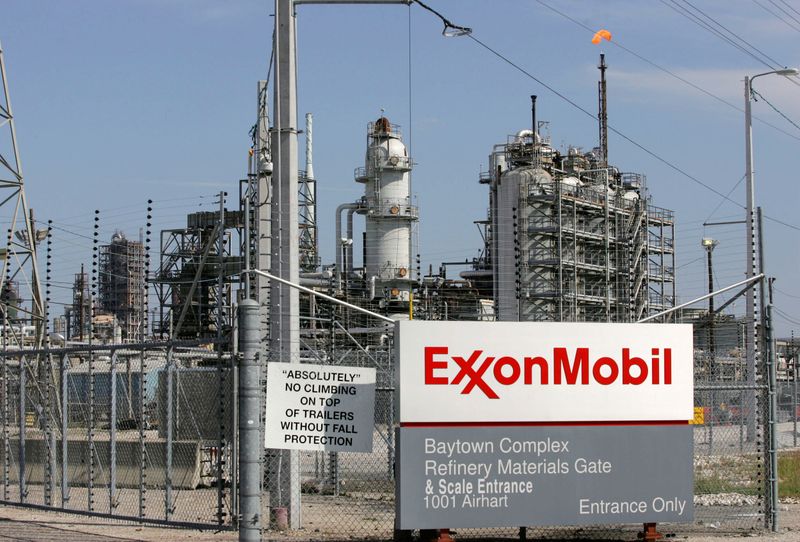By Caroline Valetkevitch and Chuck Mikolajczak
NEW YORK (Reuters) - Investors are in for more bad news on the energy front in the coming weeks as a host of the sector's biggest companies report quarterly results following the historic collapse in oil prices.
Forecasts for U.S. energy sector earnings this year have dropped along with oil prices, weighing on shares along with worries over debt, layoffs and possible bankruptcies.
Analysts see a 58.9% year-over-year decline in energy earnings for the first quarter, steeper even than the 37.7% decline they projected at the start of the month, according to IBES data from Refinitiv. For the year, energy earnings are estimated to drop more than 95%.
Down a whopping 46% since Dec. 31, energy is by far the S&P 500's worst-performing sector this year. For many Wall Street strategists, it has become a sector that is hard to recommend.
"It's all messy, and it suggests there's no easy way out of this. We have too much supply and too little demand," said Sameer Samana, senior global market strategist at Wells Fargo (NYSE:WFC) Investment Institute in St. Louis, which downgraded energy shares to its "most unfavorable" rating from "neutral" in early February.
The supply-demand situation needs to improve for the outlook to get better, he said. "What it needs, in a market with investors that have very little patience, is probably for some time to pass."
Results so far bear out that the season will be grim for energy. On Monday, U.S. oilfield services giant Halliburton (NYSE:HAL) reported a $1 billion first-quarter loss on charges and outlined the largest budget cut yet among top energy companies.
Oil prices have sold off amid concerns about rapidly filling storage space at the key Cushing, Oklahoma, delivery point, as demand collapses with the shutdown of businesses as U.S. states try to contain the coronavirus outbreak.
The spread of the coronavirus has cut fuel demand by roughly 30% worldwide in recent weeks, though oil inventories already had been building after Saudi Arabia and Russia in early March failed to come to terms on extending output cuts.
On Monday, U.S. oil prices ended in negative territory for the first time in history, with the May U.S. WTI contract settling at a discount of $37.63 a barrel.
Falling prices raise worries for energy firms on everything from debt to future spending to dividends, still cited as a reason to hold energy names. The S&P 500 energy index dividend yield is at 6.6% compared with 2.6% for the S&P 500 index, based on Refinitiv data.
"Probably the dividends are going to be one of the last places they look to conserve cash," Samana said.
Next week, energy majors Exxon Mobil (NYSE:XOM) and Chevron (NYSE:CVX) are due to report, while results from exploration and production companies Devon Energy Corp (NYSE:DVN), Hess and Noble Energy (NASDAQ:NBL) are scheduled to follow.
Historically, while lower oil prices are a negative for energy companies, they are often a boon for consumers and businesses that use a lot of oil, such as airlines and some chemical manufacturers.
The current collapse is different.
"You could say this is great for airlines, but nobody is flying anywhere. You could say it is great for the consumer because gasoline prices are going to go down. Guess what – nobody is filling up their gas tank because nobody is driving anywhere," said Art Hogan, chief market strategist at National Securities in New York.
"That positive benefit of lower energy prices just doesn't affect anyone in a lockdown," Hogan said. "That is true across the board."
The energy sector's weighting in the S&P 500 has fallen dramatically in recent years, now accounting for just 2.7% of the index, making it the second-smallest sector.
For earnings, S&P 500 companies are expected to see a fall of 13.6% in the first quarter. But once energy is excluded, the expected decline becomes 11.9%, based on Refinitiv data.
Even with the grim expectations, as results come in, investors could find some compelling reasons to buy.
"As the market gets more clarity into supply or demand, we do believe that is going to be priced back in and that can provide a lift into these prices," said Darwei Kung, portfolio manager and head of commodities at global asset manager DWS Group in New York.
"There will be separation between winners and losers, and even strong ones, without capital spending, their natural production will decline, so we will see a decline in production regardless," Kung said.
U.S. companies have been pulling guidance as they assess the impact of the coronavirus on their operations, but energy companies typically give little earnings guidance even in normal times.
Graphic: Relative performance of S&P energy sector to S&P 500 versus WTI crude https://fingfx.thomsonreuters.com/gfx/mkt/yxmpjmwzvrz/Pasted%20image%201587497376003.png
Graphic: Oil company 12M forward PE ratios https://graphics.reuters.com/USA-STOCKS/qzjpqbmrvxm/oilcofwdpe.jpg
